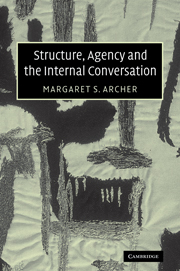Book contents
- Frontmatter
- Dedication
- Contents
- List of figures
- Acknowledgements
- Introduction: how does structure influence agency?
- Part I Solitude and society
- 1 The private life of the social subject
- 2 From introspection to internal conversation: an unfinished journey in three stages
- 3 Reclaiming the internal conversation
- 4 The process of mediation between structure and agency
- Part II Modes of reflexivity and stances towards society
- Index
2 - From introspection to internal conversation: an unfinished journey in three stages
Published online by Cambridge University Press: 05 July 2014
- Frontmatter
- Dedication
- Contents
- List of figures
- Acknowledgements
- Introduction: how does structure influence agency?
- Part I Solitude and society
- 1 The private life of the social subject
- 2 From introspection to internal conversation: an unfinished journey in three stages
- 3 Reclaiming the internal conversation
- 4 The process of mediation between structure and agency
- Part II Modes of reflexivity and stances towards society
- Index
Summary
Social theory, as a whole, is not rich in resources for modelling reflexivity, which is why the debate about introspection proved so long-lasting. However, without a substitute for introspection, there was a reluctance to abandon it, and therefore attempts to rescue it. For the most part, the debate ground to a halt at Kant's impasse: the acknowledgement that our self-knowledge was an ‘indubitable fact’, but one that we were unable to explain. Kant's problem with introspection was that it had to assume a split within the self such that we could simultaneously be both the observer and the observed, that is that we could be both subject and object at the same time. ‘That I am conscious of myself is a thought that already contains a twofold self, the I as subject and that I as object. How it might be possible for the I that I think to be an object (of intuition) for me, one that enables me to distinguish me from myself, is absolutely impossible to explain, even though it is an indubitable fact.’ During the nineteenth century, introspection's detractors accentuated this impasse. Comte made a particularly forceful argument that introspection was ‘null and void’ on these Kantian grounds. ‘The thinker cannot divide himself into two, of whom one reasons while the other observes him reason. The organ observed and the organ observing being, in this case, identical, how could observation take place?’
- Type
- Chapter
- Information
- Structure, Agency and the Internal Conversation , pp. 53 - 92Publisher: Cambridge University PressPrint publication year: 2003



